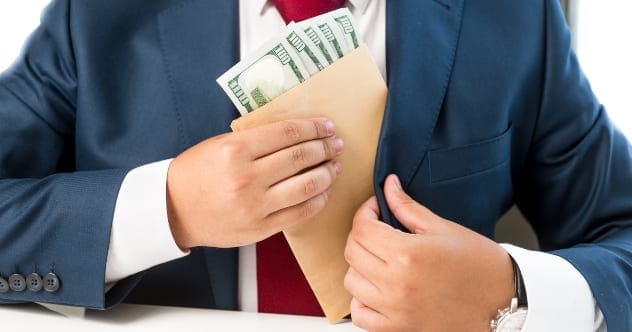Want to rationalize supporting a company with a questionable background? Dismissing any criticism against them as a “conspiracy theory” might do the trick. But, this term, possibly created by the CIA, conveniently dismisses valid concerns by associating them with extremists. It’s widely known that some companies engage in dubious activities, making these conspiracies even more disturbing. Whether fact or fiction, conspiracies are unavoidable. Here are 10 powerful companies linked to conspiracy theories.
10. Bayer
Bayer, famous for inventing aspirin, began in 1863 as a small dye company founded by Friedrich Bayer. It evolved into a pharmaceutical giant, selling aspirin, phenobarbital, and even heroin—marketed as a “non-addictive cough suppressant” for children. Post-WWI, financial struggles led Bayer to merge with competitors, forming IG Farben, infamously known for producing Zyklon B for the Nazis and operating concentration camps during WWII.
Today, Bayer invests in research and development, constantly introducing new products. However, its Nazi past lingers, with suspicion surrounding its current products. In 2016, Bayer merged with Monsanto, becoming heavily involved in pharmaceuticals and agriculture globally. Its reputation further suffered after admitting to knowingly infecting thousands of customers with HIV in the 1980s.
9. NutraSweet
NutraSweet, a GD Searle subsidiary, was created to rebrand Aspartame. Discovered in 1965, Aspartame is 200 times sweeter than sugar with almost zero calories. However, its approval process was questionable.
The FDA initially banned it after a 1980 inquiry found a high chance of “inducing brain tumors.” Donald Rumsfeld, then Secretary of Defense and Chairman of GD Searle, vowed to “call in his markers” to reverse the ban. With Reagan appointee Arthur Hayes Hull, Jr., as the new FDA Commissioner, the ban was quickly overturned. Hull later worked in public relations for GD Searle and Monsanto, which acquired GD Searle in 1985.
Political influence led to NutraSweet’s approval for the U.S. food supply, despite reports of severe health impacts. Today, Aspartame is found in numerous gums, diet sodas, and children’s vitamins.
8. DeBeers
If you’ve ever bought a diamond engagement ring, thank DeBeers. Founded by Cecil Rhodes in 1880, this billion-dollar diamond business created the marketing campaign that popularized diamond engagement rings. DeBeers also artificially restricted diamond supplies to control prices. But are diamonds truly valuable? According to DeBeers Chairman Nicky Oppenheimer, “Diamonds are intrinsically worthless.”
DeBeers has admitted to fixing diamond prices, pleading guilty in 2004. Although now focused on branding and retail, its history in South Africa, price-fixing, and connections with the Oppenheimer family raise questions about the true value of diamonds.
7. Dominion
Americans take elections seriously, expecting consensus after the results. Disagreements often lead to conspiracy theories, such as those surrounding Dominion Voting Systems. Dominion Voting Systems provides election services and machines used in many U.S. states, including swing states. Since the 2020 election, it has faced accusations of impropriety, including theories that China owns Dominion, the machines switch votes, and warnings from senators in 2019. Dominion is actively fighting these claims with defamation suits.
6. Volkswagen
Unlike many companies on this list, Volkswagen was founded by the Nazi Party on May 28, 1937, as Volkswagenwerk, meaning The People’s Car Company. Hitler wanted an affordable German car to rival Henry Ford’s Model T, showcasing Nazi Germany’s strength.
With Dr. Ferdinand Porsche, the VW Beetle was created. After the war, it became a top-selling auto importer for the U.S. Volkswagen enjoyed a benign reputation and was considered a leader in green technology until September 2015, when it was revealed that they sold nearly 600,000 cars designed to cheat emissions tests. Volkswagen blamed “a couple of software engineers,” but it’s alleged that CEO Martin Winterkorn knew and authorized the cover-up.
5. Nestle
Nestle is known for chocolate, but water sales are significant despite activists urging them to stop. Besides creating plastic waste, Nestle lobbied the World Water Council to redefine clean water from a “human right” to a “human need,” buying up clean water supplies to sell back at high markups, fueling speculation about privatizing water.
Nestle also aggressively marketed baby formula as a healthier alternative to breast milk. When demand waned in the U.S., they targeted Africa in the 1970s, coinciding with a surge in infant fatalities. The WHO and UNICEF linked millions of baby deaths from malnutrition and diarrhea to contaminated water used to mix the formula. Nestle blamed the mothers.
4. Coca-Cola
Coca-Cola is one of the most recognized brands globally. Despite knowing soda isn’t healthy, we still consume it. The company spends millions on branding, charity, and public relations. Many believe Coca-Cola and “Big Sugar” are like the cigarette companies of the 1960s. The conspiracy suggests they secretly fund non-profits to promote exercise over diet to combat obesity.
It’s not just that soda fuels the obesity crisis, but Coca-Cola has actively concealed these facts, even bribing health officials to blame dietary fat.
3. Google
Google dominates the internet search engine market. With YouTube and parent company Alphabet, it’s rife with conspiracy theories. When a corporation drops “Don’t Be Evil” as its motto, suspicions arise. Conservatives and anti-establishment voices argue that Google silences dissenting viewpoints through search optimization. Whistleblowers have fueled suspicions of Google’s treachery.
Project Dragonfly, a search engine built for China, tracks users and censors information the Chinese Communist Party disapproves of. After leaked internal memos, Google claimed to have abandoned the project, but many are skeptical. How much can a company that sells your data and lies about it be trusted?
2. Planned Parenthood
Planned Parenthood provides health and family services to many Americans, including legal abortions. The conspiracy stems from founder Margret Sanger’s advocacy for eugenics.
Her followers worked hard to conceal her motivations, but as her writings and speeches (including keynoting for the KKK) became public, Planned Parenthood distanced itself from her. They removed her name from buildings and acknowledged their “contributions to historical reproductive harm within communities of color” and Sanger’s “racist legacy.” Allegations of for-profit abortion schemes and jailed whistleblowers further darken Planned Parenthood’s image.
1. Monsanto
Monsanto has perhaps the worst reputation of any company. Founded in 1903 by John Francis Queeny and named after his wife Olga Monsanto, it began by making saccharin. Monsanto then produced PCBs, DDT, and Agent Orange, a defoliant used in the Vietnam War that caused birth defects in half a million babies.
Lawsuits followed, and Monsanto entered bio-agriculture, discovering Glyphosate (Roundup) and creating genetically modified crops resistant to it. Despite initial reports, linking Glyphosate to cancer, the EPA later claimed it’s not carcinogenic, but many believe Monsanto covered up the link.
In 2016, Bayer purchased Monsanto, now the world’s largest seed supplier. Theories suggest Monsanto has secretly taken control over the global food supply and seed banks, compounded by the Bill Gates Foundation’s purchase of 500,000 Monsanto shares. If you control the crops, do you control the world?
These are just a few examples of the many companies tied to conspiracy theories. Whether these theories hold merit or are simply products of speculation, they highlight the importance of transparency and ethical practices in business.
What do you think about these corporate conspiracies? Leave your comment below!










